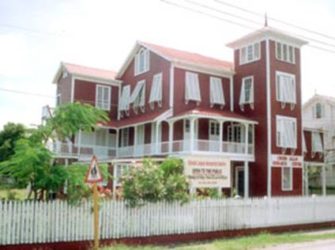Acting Chancellor Yonette Cummings-Edwards has ruled that the court does have jurisdiction to hear the case brought by the Cheddi Jagan Research Committee Inc (CJRCI), which is challenging the revocation of its lease to Red House.
Anil Nandlall, counsel for the CJRCI, had previously argued that the constitution provided for the High Court to hear and determine the case.
In a supporting affidavit, Nandlall had advanced that it was undisputed that it was President David Granger who ordered that the lease for the building be revoked. He had said further that it was in those circumstances that the applicant approached the court seeking its protection on the ground that the threatened revocation of its leasehold interest amounts to a deprivation of its property without proper compensation.
Attorney General (AG) Basil Williams SC had contended that the court had no jurisdiction to hear the case, owing to the applicant’s non-disclosure of a number of material facts.

Speaking with the media after the ruling was handed down in-chambers yesterday, Williams said that the court’s ruling “in effect means that the president has no immunity.”
Williams reminded that it was the applicants who said they believed the revocation was ordered by President Granger. If this is their belief, the AG said, they ought not to bring any civil proceedings against the president since he is a sitting president, and has performed an act pursuant to the functions of his office.
Williams said that a sitting president has immunity under Article 182 of the Constitution.
Noting the applicant’s lawsuit against the Commissioner of Lands and Surveys, the AG said that any action taken by that Commissioner is under the authority of the president. According to Williams, to move against the act of the Commissioner of Lands and Surveys is to, therefore, move against the president “through the backdoor.”
The AG reasoned that the effect of its application on the point of jurisdiction being overruled is tantamount to the applicant being able to sue the president, whom they believe issued the revocation order.
As he had previously argued, Williams again advanced that on the basis of the Court of Appeal decision in case of the Guyana Power and Light Inc. and Wong, when an application is made to the court ex parte, the applicant is under a duty to make full disclose of all materials facts.
He said that any statue impacting the issue must be disclosed. He referred to one such statute in this case, being the Deeds of Commercial Registry Act, of which he said Section 13 stipulates that any lease over 21 years must be executed in the manner of a transport before the court and must be filed as a matter of record in the registry.
Once these things are not done, Williams said, they cannot be pleaded in a court of law. In other words, he said, the court cannot take jurisdiction of such a matter.
The AG said that contrary to Nandlall’s contention that Section 13 does not apply to government lands, it does.
According to Williams, the effect of the court’s decision to hear the matter will now enable Nandlall to include former President Donald Ramotar’s late bill affidavit, which purports to patch a hole in his application by claiming that presidential approval was given for the lease.
Williams said that Nandlall has been given the opportunity by the court to include in his responding affidavit the assertion that the CJRCI had presidential sanction. The AG is, however, contending that the applicants had no such approval.
Ramotar had previously said that while he was president, he authorised and sanctioned the issuance of the lease of Red House to the CJRCI.
The matter will continue at the High Court in Georgetown on April 12th and April 21st for arguments on the substance of the applicant’s affidavit.
On December 30th, 2016, CJRCI secured an order from the court against the government’s revocation of its lease. The consent order operated to freeze the government’s instruction that the High Street premises be vacated by December 31st. It sought to restrain the Attorney General and every other officer of the state “from evicting or ejecting or in any way, interfering with the peaceful and quiet occupation and possession of this building by the Cheddi Jagan Research Institute.”





